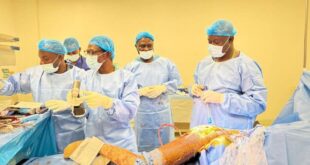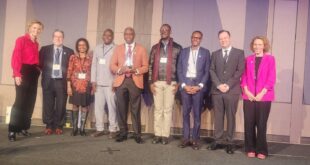
Tamale, Ghana – There are many people who believe that they can never make it in life once they dropout from school. It is even worse when such people begin to think or see themselves as the most stupid, incapable or a failure in their class, family or among their friends.
Suffice it to say, it is not the fault of people like that when they begin to see themselves that way when they dropout from school for reasons such as being sacked for poor academic performance, defaulting in payment of fees or for a serious offense.
There are instances some people after being sacked from their school or when they are no longer interested in schooling and decide to dropout, find it difficult to continue with their education in the same school or elsewhere when they are repeated or transferred by their parents.
This is because of their inability to deal with the feeling of needless guilt, humiliation and inferiority complex among their peers and family for being sacked for poor academic performance or a serious misconduct.
I am not by this article suggesting to any individual or group of people who are currently in school to dropout. However, I also want to make the point that, there is nothing bad about being a school dropout; being a school dropout does not mean that you are the most stupid, unintelligent, incapable or useless person in life.
You only become useless when you cannot express yourself in the Queens language by speaking, spelling or writing your name or a letter of application and making good use of the little knowledge acquired within the period you spent in school prior to dropping out.
Need I remind you that history is replete with many names of successful men who dropped out from school for various reasons including the ones cited in this article? Jeannie Fulbright is not wrong after all when she said: “If the purpose for learning is to score well on a test, we’ve lost sight of the real reason for learning”.
If schooling is just for the purposes of passing exams as most African and more especially Ghanaian parents always think, people like Bill Gates, Founder of Microsoft, Mark Elliot Zuckerberg, Founder of Facebook, Richard Branson, Founder of Virgin Group and David Karp, Founder of Tumblr among others, who dropped out from school at various stages for one reason or the other, would not have achieved all that they have been able to achieve.
Many of children including adults, who are currently schooling, aspire to be great, but they seldom read biographies or autobiographies of great achievers and how they made it to the top of their chosen careers. Parents, who want the best for their wards, ought to encourage them to read the success stories of great people who have made it to the top, many of them without the full complement of formal education.
At this point, I think it is more appropriate to cite the biographies of two great scientists, who dropped out from school due to the inability of their parents to pay their school fees and yet, by educating themselves, they eventually made it to the top. Their stories will provoke anyone who has dropped out to do something worthwhile with their life.
Centuries after their return to eternity, I am yet to come across anyone from their respective countries and other parts of the world that has attained same or similar feats. In fact, these two personalities are real movers and shakers in many spheres of life.
I admire them so much so that, any time I read their biographies, I ask myself how is it possible for someone with just two years of formal education to achieve all that they achieved. I know of people who have completed senior high school, college, polytechnic and even university and still cannot write an impeccable application letter to get them a job.
Born in Boston, Massachusetts on 17th January 1706, Benjamin Franklin was a printing press apprentice who had only two years of formal education; he attended the Boston Latin School between 1714 and 1716.
Franklin dropped out due to his parent’s inability to pay his school fees and so, his dream of becoming a priest was dashed. He literally taught himself how to read and write and would use his money for launch at the workplace to buy relevant books to read. Yet, he grew up to become one of America’s foremost diplomats.
He founded a national daily, Pennsylvania Chronicle and edited it himself. He founded the University of Pennsylvania which Ghana’s first President Osagyefo Dr. Kwame Nkrumah once attended.
A noted polymath (a person who knows a lot about many different subjects), Franklin was a leading author, printer, political theorist, politician, postmaster, scientist, musician, inventor, satirist, civic activist, statesman, and diplomat. According to Wikipedia, thefamouspeople.com and a few other online sources, as a scientist, Franklin was a towering figure in the American enlightenment and the history of physics for his discoveries and theories regarding electricity.
He invented the lightning rod, bifocals, the Franklin stove, a carriage odometer, the glass ‘armonica’, the flexible urinary catheter, library chair, step ladder and the swim fins, etc however, he never patented any of them. He did so, as he believed that his innovations were not mere sources of moneymaking but would raise the living standards of the masses.
Franklin helped drafted the Declaration of Independence and the U.S Constitution, and negotiated the 1783 Treaty of Paris which marked the end of the Revolutionary War. In the words of historian Henry Steele Commager, “In a Franklin could be merged the virtues of Puritanism without its defects, the illumination of the enlightenment without its heat.”
His colourful life and legacy of scientific and political achievement, and status as one of America’s most influential Founding Fathers, have seen Franklin honoured on coinage and money; warships, the names of many towns, counties, educational institutions, namesakes and companies; and more than two centuries after his death, countless cultural references. His influence has been so great on the country that many scholars have gone as far as to describe him as “the only President of the United States who was never President of the United States.”
A similar story is told of Michael Faraday, one of the world’s greatest scientists, who was born in Newington Butts (today a part of the London Borough of Southwark) on 22nd September 1791. He also had only two years of formal education and dropped out because of his parents’ inability to pay his school fees.
 Like Benjamin Franklin, Faraday was also a printing press apprentice. He was paying money to attend scientific exhibitions. His interest in science grew stronger as a result of him always reading science fictions which people brought to his work place to print.
Like Benjamin Franklin, Faraday was also a printing press apprentice. He was paying money to attend scientific exhibitions. His interest in science grew stronger as a result of him always reading science fictions which people brought to his work place to print.
One day, he attended a scientific exhibition organized by Professor Humphrey Davy, a physicist and as he sat down watching what was going on, he was able to grasp a few things. Excited by the experiments, he took notes, bonded them and later sent them to Prof. Davy.
There came a time the lab attendant of Prof. Davy left and there was the need for someone to fill the vacancy. So Prof. Davy rode on his horse back and went searching for Faraday since he knew him to be someone who had interest in science.
Faraday left the printing press job and began nurturing his ambition in science as a lab attendant and after Prof. Davy passed away, Michael’s biographer wrote: “After a while, they discovered that Faraday was a far richer logical thinker than his master.” Today, Michael Faraday is on the lips of anyone who has something to do with science. He has been hailed as the greatest inventor in British history.
Faraday’s discoveries led to the development of the electric motor. He discovered the basis for the magnetic field concept in physics; Shielding effect used in what is now known as a Faraday cage; electromagnetic induction, diamagnetism and electrolysis using the voltaic pile.
He established that magnetism could affect rays of light and that there was an underlying relationship between the two phenomena; His inventions of electromagnetic rotary devices (motors and generators) formed the foundation of electric motor technology; and homopolar motor.
In chemistry, he also discovered benzene, investigated the clathrate hydrate of chlorine, invented an early form of the Bunsen burner and the system of oxidation numbers, and popularized terminologies such as anode, cathode, electrode, and ion.
Faraday was deeply involved in the education sector as well. He is known to have given Christmas lectures on the chemistry and physics of flames at the Royal Institution for a record nineteen times between 1827 and 1860. For this accomplishment, the University of Oxford granted Faraday a Doctor of Civil Law degree (honorary) in June 1832.
In 1838, he was elected a foreign member of the Royal Swedish Academy of Sciences and later in 1844, Faraday became one of eight foreign members elected to the French Academy of Sciences.
There are a number of schools, public edifices, streets in and outside Britain that have been named after this prolific scientist. From 1991 until 2001, Faraday’s picture featured on the reverse of Series E £20 banknotes issued by the Bank of England. The picture showcased him conducting a lecture at the Royal Institution with the magneto-electric spark apparatus. Faraday grabbed the 22nd position in the BBC’s list of the 100 Greatest Britons, following a UK-wide vote, which was conducted in the year 2002.
As parents, it is good to inspire our children to think and believe that they can be that great person or achiever they aspire to become if they can concentrate on thorough search for knowledge without focusing too much on only passing their exam. A child who focuses only on passing exams does not help to bring out their innate potential. Eventually, they only value mediocrity throughout their life rather than being a genius or innovator.
The main purpose of learning or schooling is not to pass exams but to acquire knowledge and use it to solve problems. We use the knowledge acquired through education to provide solutions to problems affecting us and our society and not to use it to kill, destroy or steal.
By Joseph Ziem
 Savannah News Online Reporting Only What Matters Most
Savannah News Online Reporting Only What Matters Most



